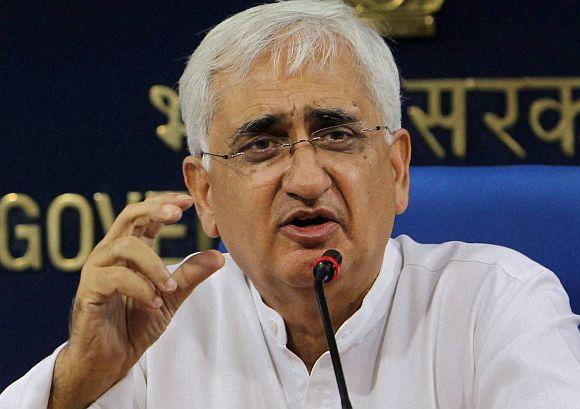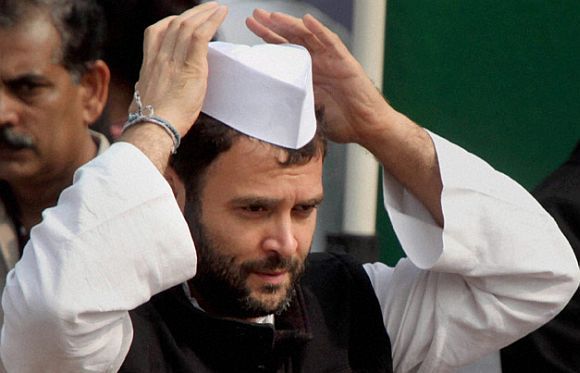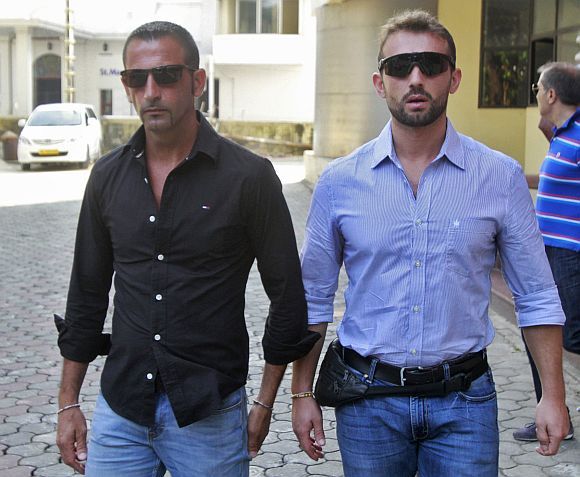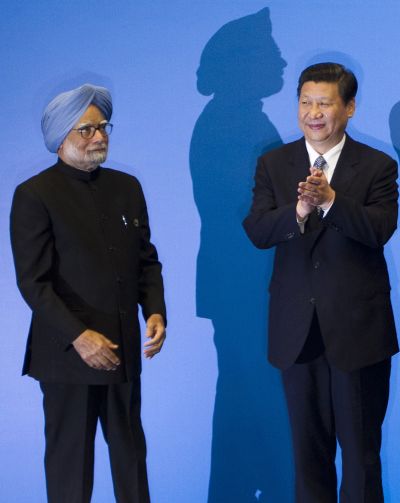 | « Back to article | Print this article |
'Rahul's critics must know he's Cong V-P, not India's PM'
External Affairs Minister and senior Congress leader from Uttar Pradesh, Salman Khurshid, tells Kavita Chowdhury that the Bharatiya Janata Party is extending support to Narendra Modi out of sheer desperation, for the party sees in him a trump card to power.
In light of much speculation over early polls, do you believe the United Progressive Alliance will complete its full term?
The UPA has an agenda to fulfil, and we would like to finish it in its entirety. But a democracy is based on numbers, and the fact that some party wants to derail the ruling coalition... From the UPA's point of view, an early election won't take place.
The UPA is increasingly being accused of not managing its allies well. What do you have to say about the "hiccups" from the Samajwadi Party?
Our relation with the SP is only "hiccups"; it is not viral (fever). It will be resolved soon. As for our relationships with our allies... allies drop out because they grow out of it. Even the Bharatiya Janata Party has parted ways with its allies in the past. The Rashtriya Janata Dal, for instance, left us but Lalu Yadav has been with us whenever needed. Allies have to judge their priorities; local conditions change but you can part as friends.
What about the Trinamool Congress?
The TMC is not a friend when it comes to Bengal, where we cross paths. Local considerations pull us in different directions, but contradictions can be managed with dignity. On the Dravida Munnetra Kazhagam pullout, the TMC said the party supported the UPA's foreign policy. This only shows that we had chosen our now-former ally wisely.
Please click NEXT to read further...
'Rahul is leading from the front now'
On Rahul Gandhi, you famously said, "We have only seen cameos of his thought and ideas...". Has he now shown us his thoughts as yet?
Yes, he has. We were waiting for the grand announcement; it happened at the Chintan Shivir where Gandhi became the party vice-president. Since then, he's taken upon himself the role of a leader. He is leading from the front now, and I must say, he is hands-on. Of course, the party president remains, but he is taking care of the day-to-day functioning.
In his (Gandhi's) speech at the Confederation of Indian Industry's gathering, he spoke of strengthening grass-roots democracy and boosting entrepreneurial skills.
As far as the criticism goes -- that he did not address crucial issues -- remember, Gandhi is the Congress vice-president, and not the prime minister. Within the party, he gives us his views... But for public statements, he chooses what to speak and the platform where to speak from. He is addressing important issues on specific public occasions.
For us, he is providing us the leadership within the party. After all, ideology and leadership are two active participants in the political process.
Gandhi has deep commitment to bringing about a radical change in the society. And, for him, the road map is an evolving blueprint. For us in the Congress, Gandhi's role is refreshing, impelling us to change, as well.
Will we see a Gandhi-Narendra Modi face-off in 2014?
I don't think the Congress is consciously building towards a face-off, but you never know. For Modi, I don't think it's an easy task to get to the top of the BJP leadership. Within the BJP, there are many contenders. The party is extending support to Modi out of desperation for it sees in him a trump card to power. For the Congress, our leadership is known; for the BJP, it is yet to be clear.
Please click NEXT to read further...
'Quiet diplomacy works'
You've been quoted as saying the "quiet diplomacy" with Italy worked. Was that the only factor in bringing back the two Italian marines to India?
I am absolutely convinced that "quiet diplomacy" works. But the Supreme Court's orders also expedited the matter.
Why are people unwilling to display their patriotic zeal? We got them (marines) back because we are Indians. There were no secret deals and dealings. Both countries have a commitment to international law. It was diplomacy for sure -- India insisted that the marines should return, and Italy agreed.
The credit goes not just to the UPA but to the "unknown" diplomat. Individual diplomats did their job -- it was Indian diplomacy at its best.
The government has been criticised for giving into the Italians by assuring them that no death penalty will be awarded to the two Italian marines. You have been accused of prejudging the case, and in effect, making it "toothless".
We have not assured them anything... we have not assured them that there will not be any death penalty. We have only clarified that it is not a "rarest-of-rare" case. Those cases involve undue cruelty, an act of terrorism, or a motive of a devious kind. I sought the attorney general's opinion, and he said it was not a fit case for death penalties.
Moreover, the fact that the Supreme Court didn't pull us up -- we explained the circumstances in which the marines came back. The statement that I made in Parliament was also a reiteration of the clarification that it could not be categorised as a "rarest-of-rare" case.
Please click NEXT to read further...
'We are not afraid of China'
What gave the UPA government the confidence to go ahead with its stand on the United Nations Human Rights Council vote on Sri Lanka, despite the DMK's threat to pull out?
It was a question of an ideological commitment on India's foreign policy. As far as Tamil Nadu is concerned, contrarian views were expressed not just by opponents, but three of our ministers from the state. Keeping those sentiments in mind, we made a departure from the past.
We have gone much further than we have ever gone. In the past, we have never taken part in a country-specific resolution; we have never encouraged third-party multilateral interest of domestic nature. But in these extraordinary circumstances, where there were human rights violations, we have in the resolution demanded "credible and impartial enquiry to the satisfaction of the international community". We had to perform a very difficult role -- balancing principles and pragmatism.
Our relations with Pakistan seem to have hit a rough patch. Has the much-talked-about visit by Prime Minister Manmohan Singh been ruled out now?
Our relations with Pakistan are stable but a little-bit sleepy -- it's rather a lull. We've been through a rough patch, but haven't shut the gates completely. Let the elections (in Pakistan) get completed; let us wait for a new government to take charge.
As for the prime minister's visit, it can take place only when the new administration renews its invitation. The prime minister has invested a lot of time and energy in improving our relations in our neighbourhood; each of our economies faces a difficult task.
While we might desire friendly relations with our neighbours, the strategic threat posed by China...
We are not afraid of China. China is an important neighbour -- we have issues but we have learnt to live together with our differences. Our foreign policy is not China-centric. Be it in Maldives, in the GMR case where the China angle was much-talked about, or in Bangladesh, Sri Lanka, Bhutan -- each of these countries has strong cultural links with India, and nothing that China can offer them can be a substitute for these.
TOP photo features of the week
Click on MORE to see another set of PHOTO features...





